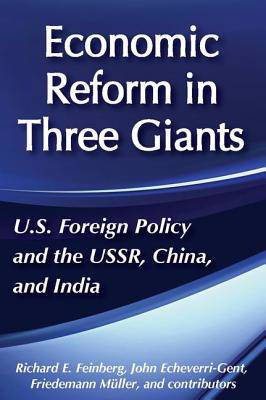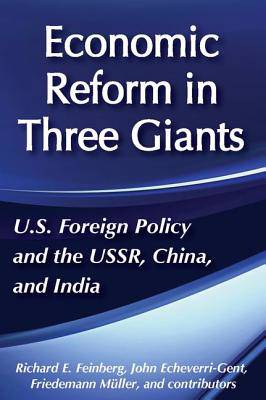
- Retrait gratuit dans votre magasin Club
- 7.000.000 titres dans notre catalogue
- Payer en toute sécurité
- Toujours un magasin près de chez vous
- Retrait gratuit dans votre magasin Club
- 7.000.000 titres dans notre catalogue
- Payer en toute sécurité
- Toujours un magasin près de chez vous
United States Foreign Policy and Economic Reform in Three Giants
The U.S.S.R., China and India
305,45 €
+ 610 points
Description
Three of the largest and strategically most important nations in the world -the Soviet Union, China, and India - are currently in the throes of historic change. The reforms in the giants are transforming global economic and geopolitical relations. The United States must reexamine central tenets of its foreign policy if it is to seize the opportunities presented by these changes.This pathbreaking volume in the Overseas Development Council's series analyzes economic reform in the giants and its implications for U.S. foreign policy. Each of the giants is opening up its economy to foreign trade and investment. What consequences will this have for international trade? Each giant is attempting to catch up to global technological frontiers by absorbing foreign technologies: In what areas might cooperation enhance American interests, and in what areas must the U.S. protect its competitive and strategic assets? What role can key international economic institutions play to help integrate the giants into the international economy? The contributors suggest how U.S. foreign policy should anticipate these new circumstances in ways that enhance international cooperation and security.Contents: "Overview: Economic Reform in the Giants and U.S. Policy," by Richard E. Feinberg, John Echeverri-Gent, and Friedemann Miiller; "Economic Reform in the USSR," by Friedemann Miiller; "Economic Reform in China," by Rensselaer W. Lee III; "Economic Reform in India," by John Echeverri-Gent; "The Politics of Economic Reform in the Giants," by John Echeverri-Gent, and Friedemann Miiller; "Economic Reforms and International Trade," by Thomas Naylor; "Technology Transfer to the Giants: Opportunities and Challenges," by Richard P. Suttmeier; and "The Geopolitical Consequences of Reform in the Giants," by Elena Borisovna Arefieva.
Spécifications
Parties prenantes
- Editeur:
Contenu
- Nombre de pages :
- 256
- Langue:
- Anglais
- Collection :
Caractéristiques
- EAN:
- 9780887383168
- Date de parution :
- 30-01-90
- Format:
- Livre relié
- Format numérique:
- Genaaid
- Dimensions :
- 152 mm x 229 mm
- Poids :
- 452 g






